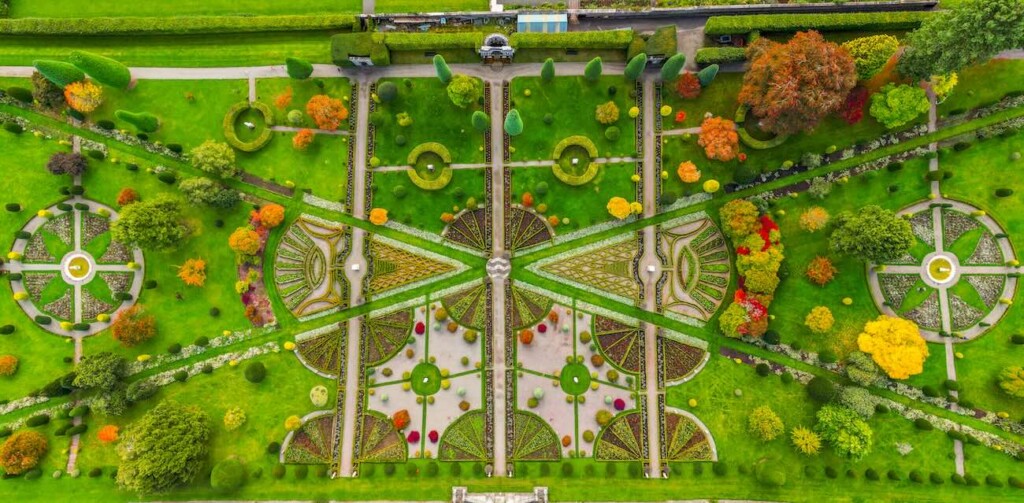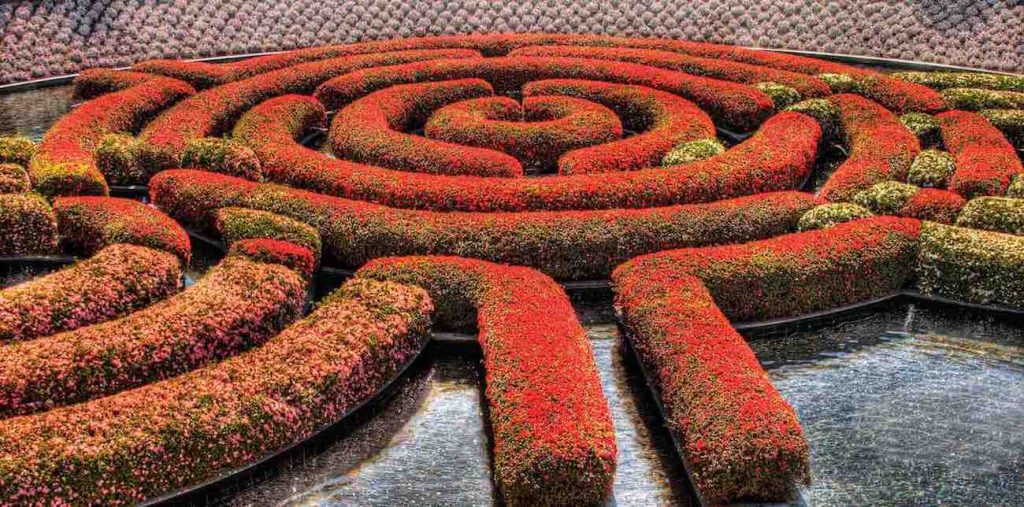 Drummond House and Gardens in Scotland with formal gardens dating from 1630 designed in geometric patterns –SWNS
Drummond House and Gardens in Scotland with formal gardens dating from 1630 designed in geometric patterns –SWNSWell-designed gardens help people relax straight away, as they cause viewers to look at them differently, suggests new research.
Our gaze shifts quicker and more often in such green spaces, say scientists, who believe their findings could ultimately help people affected by neurodegenerative diseases.
The international research team thinks they may have found “the key” to understanding the relaxing effects gardens can have on viewers, explaining that such gardens are specifically designed to let the viewer’s gaze wander.
To investigate what it is about those gardens that makes people feel more relaxed when viewing them, they went to the Murin-an garden in Kyoto, Japan, where they assessed the impact on the observer compared to a less maintained garden.
“Well-designed Japanese gardens have evocative and abstract sceneries designed in great detail,” said study author Professor Seiko Goto.
“These sceneries encourage the viewer to observe longer to understand the composition and meaning of the scenery, while the gaze wanders more and faster.”
Study senior author Professor Karl Herrup, a neurobiologist at the University of Pittsburgh in the US, said they found a correlation of rapid gaze shifts and a reduction in heart rate and improved mood, which may also serve as an aid for meditation.
GREAT IDEA: Village Curbs Speeding by Planting Thousands of Flowers Because Drivers Slow Down as They Pass By
“The reduction in stress experienced by viewers of a well-crafted Japanese garden is largely due to the design features that lead the viewer to engage in frequent, rapid horizontal shifts in gaze.”
 Getty museum garden maze – Credit: vgm8383, CC license
Getty museum garden maze – Credit: vgm8383, CC licenseDuring a day of maintenance in 2023, the research team was able to get undisturbed access to the Murin-an garden. Similarly, the second garden, located at Kyoto University, was unpopulated during the time they conducted the experiment there.
A total of 16 students observed both gardens for seven minutes.The researchers recorded eye movements, heart rates before and during the observation, and mood before and after viewing the gardens.
Unlike the university garden, in the Murin-an garden viewers’ fixation points were spread more widely, covering the entirety of the field of view.
Prof. Goto, a researcher at Nagasaki University in Japan who specializes in landscape architecture, said: “To induce such close attention of the viewer, not only quality of design but also quality of the maintenance is important. Viewers’ gaze keeps moving to seek more fascination on the well pruned trees and speckless ground.”
LOOK: Britain’s Best Gardening Couple Outdo Themselves With Spring Spectacular Oasis
All the participants indicated that they felt more relaxed and wanted to revisit the Murin-an garden, which they favored much more than the university garden.
The researchers said their findings, published in the journal Frontiers in Neuroscience, could have some similarities to other therapies that utilize eye movement to reduce stress.
The positioning of design elements is “crucial”. While both gardens incorporated water features, stones, trees, and a bridge, in the Murin-an garden, the viewer’s gaze is guided through horizontally arranged elements. But in the university garden, the objects of greatest interest are in the centre of the visual field.
PLANNING A GARDEN? Download a Free Native-Plant Garden Plan for Your Specific US Region
“The Murin-an garden was designed as a viewing garden that should be appreciated from a specific vantage point relative to the design elements,” said Prof. Herrup. “It is this attention to detail that coaxes the eyes into the patterns that relieve stress.”
Prof. Goto believes their work might help people affected by neurodegenerative diseases, saying it could be used as a form of therapy outside of hospitals, senior homes or women’s shelters.
ANOTHER IDEA: Ditch That Hard-to-Grow Lawn And Start Cultivating Moss, Instead
“I think it would be good if Japanese gardens are built not just as a luxury but as a means of mental care in our aging society,” she concluded.
SPREAD THE CALM By Sharing the Tips With Gardeners on Social Media…
Source link

